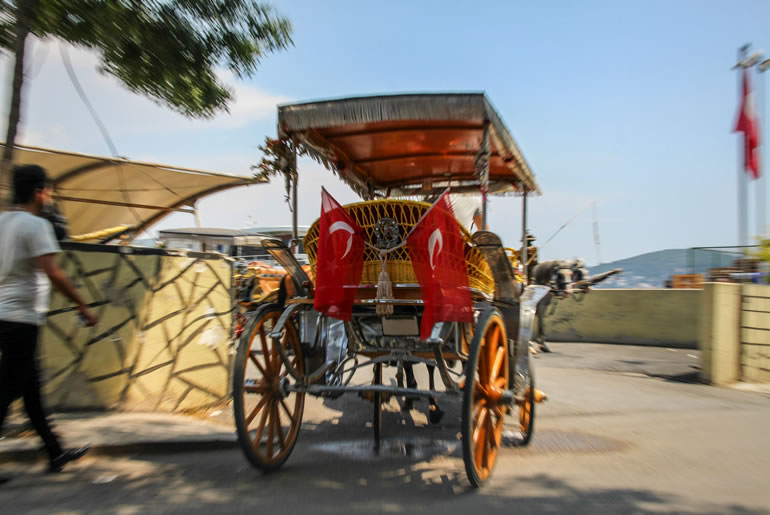Turkey, a beautiful country straddling two continents, offers a wealth of cultural and historical experiences. However, before embarking on your Turkish holiday, it is essential to be financially prepared to make your trip as smooth and enjoyable as possible. One of the critical aspects to consider is having cash on hand during your travels.
Navigating through Turkish markets, bustling streets, and local shops, tourists often find that cash is the most practical and widely accepted form of payment. Additionally, having cash on hand can come in handy when encountering any unexpected expenses or emergencies. To fully immerse yourself in the Turkish experience, it is vital to understand how the local cash system operates and budget your expenses accordingly.
Key Takeaways
- Have cash on hand for easy navigation in Turkish markets and local shops
- Budget your expenses carefully to avoid financial stress during your holiday
- Be mindful of local scams and safety concerns while exploring Turkey’s cultural offerings
Understanding the Cash System in Turkey
Turkey has a unique cash system, with the Turkish Lira (TRY) as its official currency. While travelling to this beautiful country, it is essential for tourists to familiarise themselves with the local currency and its exchange rates to avoid any monetary hassles during their holiday.
Firstly, it is vital to keep an eye on the exchange rate between the Turkish Lira and your home currency. Exchange rates may fluctuate, and staying updated on these changes can help you make better decisions when exchanging money and budgeting your trip.
Although credit and debit cards are becoming more widely accepted in Turkey, especially in metropolitan areas like Istanbul and Ankara, cash remains the preferred method of payment in many places. This includes local markets, street food vendors, small shops, and some tourist attractions. Thus, carrying a sufficient amount of cash in Turkish Lira is crucial for a smooth holiday experience.
One should also be aware of the various denominations of the Turkish Lira, ranging from banknotes of 5, 10, 20, 50, 100, and 200 Lira, to coins called “kurus” in values of 1, 5, 10, 25, and 50, with 100 kurus equalling to 1 Lira. Keeping an assortment of notes and coins makes transactions more manageable, especially when exploring local markets and shops.
When arriving in Turkey, it is advisable to exchange a small amount of money at the airport, enough for immediate transportation and food expenses. However, for the rest of your trip, it is best to compare exchange rates among currency exchange offices, banks, and hotels, as the rates may vary considerably. Be cautious when using ATMs, as fees might be higher than in your home country.
In summary, understanding the cash system in Turkey and being prepared with the local currency, Turkish Lira, will help travellers enjoy a hassle-free holiday enriched by authentic experiences. Remember to stay informed about exchange rates, carry enough cash, and be familiar with the various denominations to make the most of your time in this vibrant country.
Why Cash is Essential for Your Turkish Holiday
When planning a holiday in Turkey, it’s easy to overlook the importance of carrying cash. Although cards and digital payments are becoming more popular, cash is still a vital aspect of any trip to this beautiful country. Here are a few reasons why having cash handy is essential for your Turkish holiday.
To start with, Turkey is a country with a mix of modern cities and quaint villages. While you may be able to use your card in larger cities like Istanbul and Ankara, smaller towns and rural areas may require cash for payments. Local markets, street vendors, and small family-owned businesses often depend on cash transactions, allowing you to fully experience the richness of Turkish culture.
Moreover, tipping is a common practice in Turkey for services such as restaurants, taxis, and hotels. Carrying cash will ensure you can appreciate good service and support the locals who make your holiday special. It’s worth noting that many businesses that do accept cards may charge extra for processing fees, so cash can help you avoid these small but annoying expenses.
Public transport in Turkey, particularly bus and minibus services, will often require cash payment. This makes it necessary to have some notes on hand to make travelling between cities and attractions efficient and cost-effective.
Finally, having cash during your Turkish holiday allows you to have better control over your spending. Withdrawing a certain amount of money before your trip and sticking to that budget will help you avoid overspending. It also lessens the risk of card fraud or your account being compromised, giving you peace of mind during your travels.
In summary, carrying cash in Turkey will help you navigate seamlessly through various types of payments, from tipping to transportation, while immersing in the rich cultural experiences Turkey has to offer. A memorable holiday in this charming country certainly calls for having some notes at hand, ensuring a smooth and worry-free experience.
Dealing with Foreign Exchange
When travelling to Turkey, it’s crucial to have some cash in hand for various expenses. Dealing with foreign exchange is an essential aspect of any international trip, and understanding the intricacies can help make your holiday smoother and more enjoyable.
Exchange rates play a significant role in foreign exchange transactions. The value of one currency compared to pounds, varies based on market demand and supply. It’s essential to pay attention to the current exchange rates before changing your money so that you can get the best value for your currency. Travel FX consistently offer market leading rates for Turkish Lira.
In Turkey, the local currency is the Turkish Lira (TRY). Many international travellers often carry major currencies like euros, dollars or pounds. While exchanging currency, keep in mind that exchange offices and banks might charge a commission for providing their services. Therefore, it’s essential to compare different exchange facilities and their rates to obtain the best deal.
Having some local currency can help you avoid paying higher prices at tourist spots. In many places, merchants might accept payments in euros, dollars, or pounds, but the exchange rates they apply could significantly exceed those found in banks or dedicated exchange offices. To avoid such situations, it’s better to use local currency for payments whenever possible.
Here are a few tips to ease your foreign exchange experience in Turkey:
- Check the most recent exchange rates through reliable sources, comparison sites or websites.
- Compare commissions and rates at multiple exchange facilities before deciding where to change money.
- Keep in mind that some hotels and restaurants might accept payments in major currencies, but it’s generally more cost-effective to use the local currency.
Use of Plastic Money and Possible Charges
When travelling to Turkey, it’s essential to be aware of the different types of plastic money available and the potential charges involved. This not only helps in managing finances effectively but also ensures a hassle-free experience during the holiday.
Credit cards and debit cards, such as Mastercard and American Express, are widely accepted in Turkey across major hotels, restaurants, shopping centres, and tourist attractions. However, it’s essential to keep some cash handy, as many smaller establishments and local markets may not accept card payments.
It’s important to consider the possible charges associated with using credit and debit cards while travelling. Some of these charges include:
- Cash advance fees: When using a credit card to withdraw cash from ATMs, travellers may incur cash advance fees. These fees vary depending on the card issuer, and it’s advisable to check with them beforehand.
- ATM fees: Many ATMs in Turkey charge a withdrawal fee, which can range from a few Turkish Liras to a flat percentage of the withdrawn amount. To minimise these costs, consider using your debit card instead, as they generally have lower fees.
- Currency conversion fees: Charges associated with converting your home currency to Turkish Lira can also add up. Banks and credit card companies usually apply a foreign transaction fee, which is typically a percentage of the purchase amount. Make sure to check the terms and conditions of your card provider to avoid any surprises.
In conclusion, while plastic money, such as credit and debit cards, are convenient and widely accepted in Turkey, it’s crucial to be aware of the potential charges involved. Keeping cash on hand and being mindful of these fees can help in managing finances effectively and ensuring a smooth holiday experience.
Travel Insurance and its Importance
When planning a holiday to Turkey, it’s essential to consider the importance of travel insurance. Travel insurance protects travellers from unforeseen emergencies and financial losses, ensuring they can enjoy their trip with peace of mind.
One of the key reasons for purchasing travel insurance is to cover medical expenses. Should any traveller fall ill or suffer an injury during their holiday, they can incur significant medical costs. Having travel insurance allows individuals to seek medical attention without worrying about these potentially high expenses.
In addition to medical coverage, travel insurance also offers protection for other unforeseen events. For example, if a traveller’s flight is cancelled or their luggage is lost, they can be reimbursed for any resulting losses. Moreover, travel insurance can cover emergency evacuations, should circumstances require it. Such protection can be invaluable in situations like natural disasters or political unrest.
It’s essential to remember that cash alone cannot protect travellers from every potential setback. Therefore, it’s in their best interest to secure travel insurance before embarking on their Turkish adventure. By doing so, they can enjoy their holiday worry-free, knowing that they are safeguarded against the unexpected.
Budgeting Your Expenses
When planning a holiday in Turkey, it’s important to budget your expenses to ensure a stress-free and enjoyable trip. As prices may vary across different regions and activities, creating a rough estimate of how much money to bring can help prevent overspending.
Firstly, research the average prices for accommodation, transportation, and meals in the area you’ll be visiting. Turkey offers a wide range of restaurant options, from local eateries where you can taste traditional Turkish dishes to high-end establishments. Therefore, having a clear idea of the average meal costs will help your financial planning.
To help you manage your daily spending money, consider allocating a set amount for each day’s activities and purchases. This can include entrance fees to tourist attractions, shopping for souvenirs, and any additional expenses you might encounter. By having a daily budget, you can enjoy your holiday without worrying about running out of cash.
In Turkey, it’s not uncommon for certain establishments, particularly smaller businesses and market stalls, to only accept cash payment. Therefore, having an appropriate amount of cash on hand will ensure you can buy what you want without issues. While it’s good to have cash on hand, remember to also keep your bank or credit cards for emergencies or larger purchases.
Here’s a sample breakdown of a daily budget in Turkey:
- Accommodation: £20-£40
- Transportation: £3-£10
- Meals: £15-£30
- Attractions and entertainment: £5-£15
- Miscellaneous expenses: £5-£10
Please note that these are just rough estimates and can vary greatly depending on your travel style and preferences. Adjust the amounts according to the specific activities and experiences you plan to have while in Turkey.
In conclusion, proper budget planning ensures that you have a worry-free holiday in Turkey. By researching prices, allocating daily spending, and having enough cash along with other payment options, you’ll have a smooth and enjoyable experience.

Exploring Local Life and Culture
Turkey is a melting pot of diverse cultures with so much to offer. One of the primary reasons travellers need cash on their holiday in Turkey is to explore and immerse themselves in the local life and culture.
Visiting Istanbul presents a unique opportunity to mingle with locals and sample delectable Turkish street food. At the Grand Bazaar, a vibrant marketplace with over 4,000 shops, one can find delicious food items that might not necessarily accept card payments. Some popular dishes include baklava, lokum, and döner kebab. The friendly Turkish people are known for their warmth and hospitality, so don’t be surprised if you’re invited for a cup of tea or a shared meal.
Water is another important consideration during your trip. While tap water in Turkey is safe to consume, it may have a distinct taste. Visitors are advised to purchase bottled water, which is easily accessible from street vendors who mostly accept cash transactions.
Travelling outside of Istanbul can lead to other fascinating destinations, such as Cappadocia and Antalya, where you can witness the rich blend of Turkish and Roman history. Cash transactions are more commonplace in these regions since rural areas may not have the infrastructure for card payments.
Another advantage of carrying cash is the opportunity to learn the language whilst shopping. Bargaining is an integral part of Turkish culture, and it exposes visitors to the local way of life. With cash in hand, you’ll have the chance to learn and practice language skills with vendors. Turkish people appreciate travellers’ efforts to communicate in their language, and it could lead to some great deals!
In conclusion, carrying cash on your holiday in Turkey enables you to seamlessly immerse yourself in the local life and culture, indulge in the vibrant food scene, and engage with the warm and welcoming Turkish people.
Local Scams to Be Aware Of
When travelling to Turkey, it’s essential to be aware of some common scams that target tourists. In a friendly tone, here are a few examples to help you stay alert and enjoy your holiday.
Currency Scams: Sometimes, scammers may try to trick you into accepting outdated or incorrect currency. Be familiar with the latest exchange rates and Turkish banknotes. Also, ensure you only exchange money at reputable establishments.
Taxi Scams: Some taxi drivers might try to overcharge tourists by taking longer routes. Make sure you agree on the fare beforehand or use the taxi’s meter. Additionally, consider using a reputable ride-sharing app like BiTaksi or Uber for fair prices and added security.
Distraction Theft: Scammers and pickpockets may work in pairs, with one creating a distraction while the other steals your belongings. Keep a close eye on your possessions, particularly in busy areas like shopping districts and public transports.
Spontaneous Tours: While wandering the streets of Turkey, you might encounter locals offering to show you around for a fee. These “guides” might lead you to shops where they receive commission, or worse, manoeuvre you into vulnerable situations. It is best to rely on official tour guides or recommendations from your hotel.
To stay prepared during your holiday in Turkey, always be cautious and rely on official sources and establishments for services. This will help ensure a safe and enjoyable trip.

Frequently Asked Questions
Can I use euros in Turkey?
Although the official currency in Turkey is the Turkish Lira, some businesses, especially in tourist areas, may accept euros. However, the exchange rate applied by these businesses may not be favourable. It is recommended to use the local currency, Turkish Lira, for a better value.
Which currency is best to bring in Turkey?
The best currency to bring to Turkey is the local currency, Turkish Lira, as it is accepted everywhere.
What currency do tourists typically use in Turkey?
Tourists in Turkey typically use Turkish Lira, as it is the official local currency and offers the best value. It is advised to exchange money into Turkish Lira upon arrival or withdraw cash from ATMs in the country to enjoy a hassle-free experience while shopping, eating, or exploring attractions.
Can I rely on debit cards while in Turkey?
Debit cards can be used in many establishments in Turkey, including restaurants, shops, and hotels. However, it is advisable to carry some cash with you, as smaller businesses and rural areas may not accept cards. Additionally, inform your bank of your trip beforehand to avoid any issues with your card being blocked for security reasons.
How much cash should I carry in Turkey?
The amount of cash to carry in Turkey depends on personal preferences and spending habits. However, it is recommended to carry a reasonable amount of cash for smaller purchases, tips, or emergencies. Larger purchases can typically be made using a debit or credit card.
Get Lira delivered to your door
Understanding the foreign exchange process and being prepared with local currency can help you make the most of your holiday in Turkey. By incorporating the tips mentioned above, you can avoid unnecessary expenses and enjoy your trip to its fullest.
TravelFX offers a slick online ordering service and will deliver your currency directly to your door using Royal Mail Special Delivery. As well as Turkish Lira, you can find the very best rates for Euros, US Dollars, Australian Dollars, UAE Dirham, Thai Bhat and many other currencies from around the world. You can order your holiday cash securely here:






